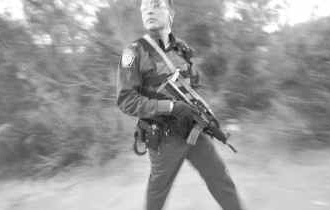 |
 |
 |
 Editorials | Issues | October 2007 Editorials | Issues | October 2007  
No Letup In Cartels' Violence
 Associated Press Associated Press
go to original


| | A Border Patrol agent checks the banks of the Rio Grande at the U.S.-Mexico border in Laredo. (Associated Press) |
Austin, TX – Escalating violence by drug cartels and deteriorating security in Mexico will make this the most deadly year yet for that nation's drug-related crime as violence keeps spilling into the United States, according to a report released this week.

On the U.S. side of the border, law enforcement has trouble battling drug smuggling and its related violence because of poor coordination, corruption and lack of resources, said the report by the Austin consulting firm Stratfor.

Fred Burton, a former State Department counterterrorism agent and now vice president for counterterrorism with Stratfor, made the report available to fellow members of Gov. Rick Perry's Border Security Council.

"The deteriorating security situation has profound implications not only for Mexico but also for the United States, since drug violence increasingly crosses the border," the report states.

The report was a follow-up to a similar one by the company last year on Mexican drug cartels.

Throughout the 17-page report, Stratfor describes two of the most powerful Mexican drug cartels, Sinaloa and Gulf, and their turf battles. Despite Mexican President Felipe Calderon's efforts, drug violence has grown, the report said.

There were 1,543 drug-related killings in Mexico in 2005 and more than 2,100 in 2006, and with more than 2,100 estimated since Jan. 1 it will "certainly make this year the deadliest yet," the report states.

At least seven killings in Laredo in the last two years have been linked to the Sinaloa and Gulf cartels. Rosalio "Bart" Reta, a 17-year-old U.S. citizen and alleged soldier for the Gulf cartel, pleaded guilty this summer to a Laredo killing and still faces charges on others.

Webb County Sheriff Rick Flores said Wednesday's report points out what he and his officers already know firsthand in the Laredo area.

"We know that the warring cartels have the resources, and we know that they have a lot of control over the border communities and we know that the threat is imminent," he said. "Yes, we do have spillover violence on this side."

Though corruption in Mexico is often criticized as part of the problem, similar situations exist in the United States along the border, Mr. Burton said.

"We're very quick to throw stones inside our own glass house," he said.

The report states: "On the U.S. side, however, the under-reporting of crimes ... and corruption among low- and mid-level U.S. law enforcement officials facilitate the northward spread of cartel activity."

Sheriff Flores said the report shouldn't have singled out local law enforcement when officers at other levels also "fall victim to this kind of shenanigans."

Conrado Cantu, the former Cameron County sheriff whose territory included the border city of Brownsville, is serving 24 years in federal prison for drug trafficking, extortion and corruption. Three National Guardsmen deployed to the Laredo sector have been charged with human smuggling; one of them has pleaded guilty.

Texas Secretary of State Phil Wilson, a border security council member, said he hadn't read the report yet, but said its description of drug cartel violence "illustrates the importance of what the state of Texas is doing with border security."

The council was set up to help state officials figure out where to spend some of the approximately $100 million the Legislature authorized this year to assist law enforcement along the Mexican border. | 
 | |
 |



